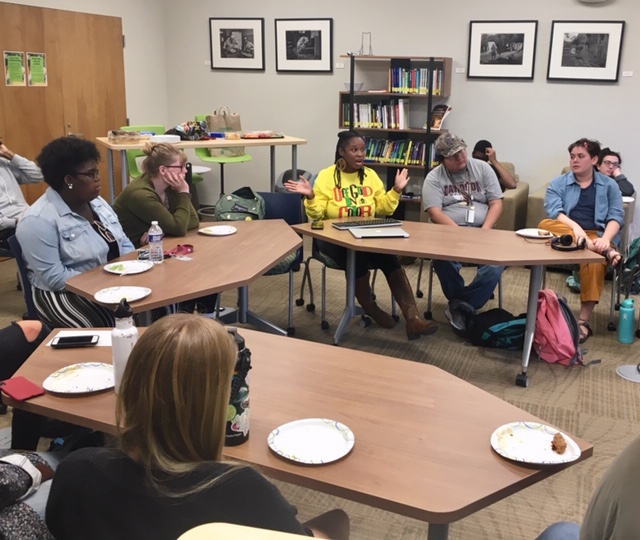Sustainability advocate visits campus
Chantel Johnson, livestock farmer and homesteader, joined the Food Justice Club as a guest speaker, sharing her insight about sustainable living, trauma, race and her role in society.
On Oct. 10, members from the Food Justice Club and interested students gathered in the Idea Incubator located in Hege Library to welcome Johnson.
Wearing a brightly colored yellow shirt with the words “Off Grid in Color,” Johnson conveyed one of her prominent themes: the acceptance and proud reclamation of our identities. As a woman of color, Johnson has branded herself as a “Black female livestock farmer,” and hopes to inspire other minorities to embrace their identities.
Johnson opened up deeply about her personal traumas, and how even in the midst of turmoil she seeks to open up paths of prosperity. Born and raised on the south-east side of Chicago, Johnson grew up witnessing gun violence and the way it can tear families apart, a heavy topic that has personally affected her life.
Johnson discussed gun possession, incarceration, limited medical attention and homicides that happen in communities of color, even the death of her brother due to gun violence. After the death of her brother, Johnson decided to have a change of scenery and, as she states, “get lost in the woods” as a means of grieving. When she decided to venture out to rural North Carolina, she found a man who gave her the opportunity to homestead on his farm.
“I found a seed, I would call this young man, and he showed me the fundamentals of homesteading, showed me how to garden, how to raise livestock in a sustainable way, how to use alternative sources of energy…and I began living small,” Johnson said.
As Johnson recounted her story, she acknowledged the importance of mental health, and finding healthy ways to deal with emotional struggles. Johnson advocates for therapy, and she herself created her own “mental health recipe,” which was focused on living an environmentally sustainable life.
Brandon Sisnett, a Guilford first year, reflected on Johnson’s story.
“It reflects how helpful Mother Nature can be, both with mental health and with providing food for yourself without the need of big corporations taking over,” Sisnett said.
“Everybody has their own way of healing, and I found healing with the animals. At first homesteading was not easy,” Johnson said.
Johnson had to leave many forms of living behind. Because she went zero-waste, she had to think of all the ways in which she could stop producing waste, and as a livestock farmer, she had to learn how to raise cattle in a way that did not negatively impact the environment. She reflected on her role in society as a being that needs from the Earth but must also aid the Earth.
“I was uncomfortable with the Earth. Even though I wanted the Earth to connect to, I was uncomfortable with her,” Johnson said. “I knew she had everything I needed, but I didn’t know how her and I could coexist together, and it was terrifying.”
This personification of the Earth as a living being connotes a sense of comfortability and demonstrates how Johnson has come to terms with her role as an environmentally conscious individual.
“This is more than me just healing from the death of my brother, but this is about me encouraging people to do the same thing, to take whatever pain that you’re going through, transforming that into power, connecting with the Earth and building community,” Johnson said. “That’s it, that’s the message right there.”
Mallory Weisman, a Food Justice Club officer who organized the talk with Johnson, pointed out that hearing stories like these are important to our cultural context.
“I think it shows how powerful food and agriculture can be for some people,” Weisman said. “Food can sometimes be dismissed as something used just to sustain us, but it can also be super powerful in creating culture and healing.”
As the talk came to an end, it became clear to me that a sustainable life consists of existing to promote the flourishing of life on Earth and within ourselves. It is a lifestyle in which we become one with the earth emotionally, spiritually and physically. It is up to us to find a path in life that transforms our pain into a path of prosperity, just as Johnson did.
Editor’s note: This story originally was published in Volume 106, Issue 3 of The Guilfordian on Oct. 18, 2019.





